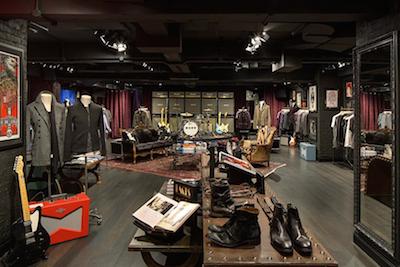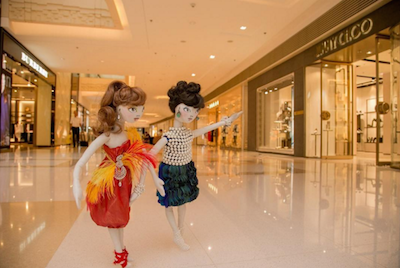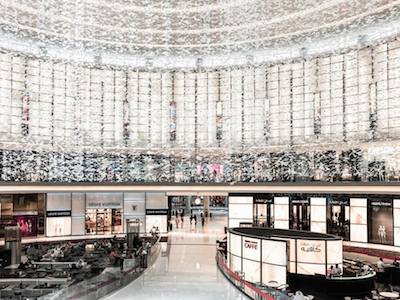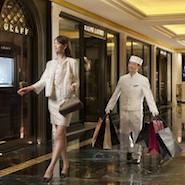Asia Pacific has become a top priority for retailers looking to expand their global footprints, with 18 of the top 50 most attractive cities for cross-border retail located within the region, according to a new report from JLL.
For its “Destination Retail Report 2016,” the retail real estate firm indexed cross-border retail activity in 50 prime cities and found that while Asia Pacific dominates the leaderboard, London is ranked in the number one spot. While luxury retailers are increasingly embracing ecommerce, having the right retail location in key cities remains a top concern.
"Structural change is sweeping the retail industry as technology and ecommerce platforms become more sophisticated; however, demand for the right physical space, in the right location, is stronger than ever," said James Brown, director of Global Retail Research for JLL.
"Borders are becoming less of an issue for retailers pursuing opportunities overseas and we're seeing the global retail landscape shifting fast to accommodate the change," he said.
JLL’s report looked at the presence of 240 brands in 140 cities worldwide that make up 36 percent of the global GDP.
Retail rankings
London achieved its top ranking due to boasting the largest number of international retailers. The large mature market is appealing for global brands looking to reach a combination of tourists and locals.
In 2014 U.S. fashion label John Varvatos opened its first European store in London (see story). Couturier Elie Saab will also open its first London boutique in spring 2016 in the Mayfair neighborhood, nearby to boutiques for Stella McCartney, Bugatti and Hermès as well as the five-star hotel Claridge’s (see story).

Inside John Varvatos' London store
Asia Pacific holds an appeal mostly due to its market size, driven by a growing middle class. For brands, cities within the region also hold the opportunities of newly built modern retail spaces.
Hong Kong is the most sought after Asian city for retail, with luxury and mass brands having to compete for storefronts. In China, Shanghai and Beijing hold high concentrations of ultra-high-net-worth individuals, making them ideal markets to build brand awareness and test interest within Asia.
Outside of China, Tokyo, Singapore, Seoul, South Korea, Osaka, Japan and Bangkok are increasingly desired locations for new boutiques.
Chinese, Vietnamese, Thai and Indian consumers anticipate having more disposable income in 2016 than 2015, according to a new report by Agility Research.
Higher anticipated disposable income likely corresponds to more money being spent on luxury goods, so a strong presence in these markets will give brands a boost this year. Navigating Asia’s marketplaces requires brands to be active both in digital and physical spaces (see story).

Elements Hong Kong mall
JLL’s research found that the Middle East is wooing many international brands, boasting five of the top 15 ranked cities within the report. Dubai, United Arab Emirates, Kuwait City, Kuwait, Abu Dhabi, United Arab Emirates, Jeddah and Riyadh, Saudi Arabia are appealing due to their affordable retail space and tourism.
For risk-averse brands, franchise structures are commonly available, allowing retailers to enter the market with a partner. A less mature domestic retail market has created a real demand, while new international players have less competition to contend with than they would in more established markets.
In 2016, department store chain Bloomingdale’s announced that it will increase its Middle Eastern presence with the opening of a store in Kuwait. Scheduled for spring 2017, Bloomingdale’s Kuwait location will be the retailer’s second international location, with the first opening in Dubai in 2010 (see story).

Dubai Mall
Within the Americas, 15 of the 16 cities to make the top 50 list are located in the United States. The U.S. has 12.8 billion square feet of retail space, the largest of any country globally.
While the mature market presents many opportunities, including diverse options for retail space spanning malls and freestanding stores, the U.S. is intimidating to global players. As a result, New York, San Francisco, Miami, Chicago and Los Angeles have large international retail presence, while other key markets remain largely domestic.
Changing landscape
A key area of opportunity identified in this report and others is the Middle East, particularly Dubai, ranked fourth by JLL.
Dubai may be trailing key luxury retail destinations such as New York and London today, but the market is projected to experience the fastest growth in sales over the next five years, according to a new report from Savills.
The Middle Eastern city currently welcomes around 14.3 million overnight visitors each year, with the number expected to rise 9.7 percent by 2020. While still catching up to more established luxury shopping hubs including London’s Regent Street and New York’s Fifth Avenue, Dubai and the Dubai Mall in particular are seeing developments that may help it rise in popularity among retailers (see story).
The retail market is changing, becoming more technologically driven and global. This has forced retailers to adapt.
Globalization and security risks are the biggest concerns for retail executives, narrowly beating out shifting consumer tastes and technological disruption, according to a new Economist Intelligence Unit report.
The report, sponsored by Demandware, found that executives are embracing a “back to basics” approach to take advantage of these changes. Although the luxury landscape will continue to change, likely at an unprecedented pace, excellent products and service are two things that will never go out of style (see story).
"Expansion into new markets is catching on quicker than ever, but not without risk," said David Zoba, chairman of JLL's Global Retail Leasing Board. "International retailers that are focused on measured and balanced growth will find that the world's mega-retail cities are a productive opportunity."
{"ct":"r5+dyMUS0MXZYllRXrSH54HWb0na6C77w0tUcjZvZXWYgnpnZCcefZDHqqxlFYIv87HThsd2ggAqd2Rbmr1OvDE8SwzpUx2wDgch6gMyPdlgOSybJty7m\/oouG6Px09BcVqVIJ\/S752IMm0\/FNgO42E1fyKUjZJOenjF7SjzWhkQQCR2s7y3f0E1qS3hiEL3tWSVzB93kfk+YOaKfIsWwklBG60+TgFQN2KLLw7yZsPHq8iIFjkBiZibyih8dIPImGbHF+c+sQOj9BenEmWbz\/QkWXL6EDwpNZ\/D4mrvmVX0CrSQr8LsVbNHUNM8sl4qjYy3PSO7HJybENDsqCOaZ5\/ScsJIK2I+Z8+wJFKVQdpX6Kq+JQkiWQLydhiVCPvgLokQZlmqebYhxRGuPCNZV2BLPfwf3kTGah7xaTQTFGWaipHflrUrUb5MsbZVi3BtMMRw0KlOmDonKKU6YnwRkAGX9Gi5qGdQQX\/\/hkhdxPijybryf9BOHm0D3X8aMcBs\/0bGr98CFbi5XgcrUt6crvsHSPVH2iEQGvUFftxnAru5jzthT6DOREJYON\/vJdjI\/kM0QXUjZ\/sjUKopnJgxBzCwX3OLCuQAkj5CEwyVk5MmsNocBVRIY+2lPQHng6tNm3gn8sy4yf2Mq5QrJy6pMJa7zpKfdIjSAvndYACaYlZPd+yhBEedIlUpettf57ZSnaykG76IppaU5vn21ZJMnOoS0HkHWcoad1sBI69ASh5nu6PTIAwKWFEAbZqUVTsI8eGZOHbadlPpd2cjJ7qnGJj5PR6hr5Zh8ZAZojtmyV6TidL8v5jwElgmuSlah0zOUzfVJ9uTjx2mriJYs+UlWDrvZMzG5MWaBVO4OUOkKjYqdmliIaPQycAumTMObx+T\/s\/LDnAn5pLo61JjreqJu+6NfcUr7TJeTGI3LHP+daswQQKuHHqJ8ie1HcueRYRgcEKNzHuTdNAtP5X+mUlORXuGZyG0kvtz82IfogFl6Es2Rg0ZL1IA4OhQzWDGzEM5PJm5VABiVrkMUaEu3mIi+yunFcSVtlx9UgDUEyPT5dNocfrL1TrF65qJOW\/kpWT69WzEyahK2Obg4hEht8reY07zvEYeGD6htqcx+tUOfktWdxXbS\/4reX4QN3DEyj63REHNvPg+\/htgJDF7dUDGq0SCJFr9vhzwo0QzYp3a1TfeA3WP2ZZRZskNmO0n89F0rJtpU0hVKrejzCgtwC3vu1bC4UkbmGPADGWt59gOekXbLUOfImcSyPhHlmPaV8bw6kQV4gLl6MY6+6toDEFQ+mj4Qztm6DBUJYIcjgJKp6sSrZ31qdjstjJ9jWP7Uc1Nbw6yz\/koTWijisiiZz0bTr1RkI3b4pW6Kf7eLzrDvXe0RK3krEbeIYfUFXZ\/Ue9zIzLIQC5eKTLmKyAe6zMnww7HuoOwnXHehnYonCYRtSdhwbXDqygyIrHetj6mxQjVh4blwpOctkUT4+58sqehCfAfInzVMcXXwhThTYYnnkyGn+Ff72Mx9P3\/xYd11+Y+u5T05qYDOHvuWjSFE9fTMZdyTlHdPJOqUYxI7RxKwwnW+jifPHeix5GP\/J7wsT\/p63D0+mptwSD6GFXODARg8mzS626oSzZjvokMOtdKVsRLED9Zh92i+sNoVC9AjuiUOOv8EcDEpNbKsWRwvc59xDkRnr+4k5Ykj5i98W1TtN\/wdTpXCc++EDwy3rD3Y0\/Bo4E8TeHJfnsUWdajlcyaRiNQGogMl3SkNfTuFtUxbKhiczjXoGP2CengWtTaUt205X7330Y07oQXARQHGN6LeM01L2PmcMBi1fK29sD5KrHA5dSutKiuF8dC23tN5vmYIgHZz6XNI3Q1yxJrPTVjK4GztbwunFqgEgHzJYGlfMskShLb6Ur+4yv5ZPn+cn8o1Yc+YY9\/3isvQsQJNDjDLkX7f+UB3EvN+IIgvlPkTLkCtIHleFtCCTW45HRNdGO58+3ue5nVAsBr4U906wTqzOPTAZ9k6+ccWAsWoIISJzdB4ilRoOyjxJdlvUfFbx4ft16b0ePj\/o3jwaHQFwA2EmvK\/k2lbyWj4RFuAkArmH703tP35P5OTimdqKnfsqTA\/GUt5s7YT31yatLZMmm2VndMfxgN8r0WKxq4xc+8gpFvvMpmO6rVrS7qczr9d9ncjjc9Fy0uSu48ukq8zTHCX5DorZJrnUtI9U3lcQ3vtHXBjPaMPGncR87Xa6qbtR34TiKTrdUGEApfG\/3fdaf61G0H9b7+65R0KGNoQ2rztVqPRHAk9kp6J058f3zGorq7R49diVffXqAgBYspt9IM8HnPSyotye\/UuGCiXgr9Pn\/nq93Mucwk7gXgYHJlb3iftKFR4\/bzt5fbt+VHc\/PqdFaadMy8n+7jeIOMXZ8FsT4dH736kCiunSe3oaO3VKjtJlhzTMbmY8SOBDp+Ecs4dDmOGDaxIUMMtGLDqmhBSG57lyejSGYvGoxdMpMFIT\/aokJek9WxhouT629hlDgeqojqeswSBrwDIAblKtIgXHR3AOl9eERayQL1AASB1yusVFxcUclen1HRISmnCIyUTtI1eaGELcnTImHx4ygvWxZ8FHVLly7Jgl2Hedrs5un1f8hVUPTAl7Q7t8yx8Jpc\/yLrS9KUgyBNw4G+LEBT5VADekUJL8xFLqGyxKDv26e3pBpzCCXnVdDqJwv5fQb89pfN6FyN18CYGk6B2QEm2AOLIc9GkqqCB6pyF32oAb1pla\/OeZ5njldBji0e\/7AY+X+z\/ccmaKZ00k3raXFuY0WZd4wUnSirzZ5dalP8trkOtcJqYXNfhD6nN\/O0D2iPmlDK2TnxtZegbwGL1kUTwG6VoD4ryC0EstCsPqxI2auTHJrYu7BELcSSB1b5eYfLQ8Q29YVFwvl8e\/Ldywa5E2AgKwbq7qWq8TydSvcIbcAqtK1NY\/aMdRzZ6l73PRKZMhEgDSC4OYsH2Gm2AX1U6vVC4Rln1ALnIBfDuqQ7CPx\/Od9FfOph6rEcHjsYXEjJj\/r0Dsdu070iR1mn3iGLcWsbhrbqpCm+t7YgbUWWrVXOk9fp+IqVkge8ul0r9z5b2LiuWgEk101iHU+a1necvjExxDg34Z7X1hWQ6GxPXGJRZ\/hvBZ3odj4M2nYgBfCz4+nRP1pifWayqmdqDWmze3uC8I\/HY6iK0m0czxwAO5SHjoXHjP6Mee+5ATCAP\/IEG9BgWyjsn6a5cVXpuONFJflpi577zjEedbJDQWS4QiPRS\/SZuo6G5fQh5\/ImMzCvTuuEPNrLfEgNGPmA3ZVoTA3TtnSfNpSoSwqzsnV5uC4ZmgrOviEf+E8K7wjKPreKXG4CkDNq4Q2Pj1FVPtnypQTb74q0BlNdulafWBNE\/nNzX6D\/5j9V0\/ZYyhg7wxX2mQlAo2QymO94nXhj4WZBfjUJryKrycgGazj0PomamDVga2PO0O\/Fz7heCABxllinvN\/hs+6rMUClvhn54M\/zh0PPWuCPEsdkJBLAmfGOLe\/yzVJJ74sI1f6O\/IvWYh9pjBMnrMQBfSXgdO6wCAzji002PmrFpsRO03hrwBAHokOYRyYP\/J4qsNWi4DxKJBjcIEhVfU6VLXwUWlbWzRsyJNUUxT7VZegaCiQ\/jRBN4Cm\/og+lcqCsGn7gU3Wp7IvUL7Gc6ZtBEhdOEcpljoaZI+WJW9Xr5fyYdKBjYY6a6NHK2\/0nHwqFR2Gl2elle2xLLVY21y8JMXcgA5\/Qf\/SY9RNZzWrjNgfX6Wv6QoGvW4sXu7uZDs0TZrmj0ptJ69jzOOLAegVbt1h19V7q1G5eDbyELCwL2M0jaF\/JOAXGSL8kBBjPzzQ+wPtpVFZFtQ6J2X7FGSLCecmqcHt2yQeMQZhzAdQd\/extxs3LGl0aSfxum3VuXIqm7SDjXWEvsqsh7PKw5PCgch+G1mJqem5RBP\/G4w6PQK5kejxCFIbPdbVypbqY5v\/waCgP2hyy4pZjJ1ebiixBUzijBxWD7c8TDNTdHHQerDNuqshk2vfVN6qDqKlFH9uMUPvCIOTzicsLKZoLIRUKrnjXxPDpfDrt50dOP3\/6dLuzO\/t9I1QBfQ6b4kRfCYC37udbEqdoMpWBkZtLHsjrFW1MQUvQlLl72zWjDF5nxaLj8OQ+dW2yWe1vce\/Dz99VV\/A8kPvw0hek1tuUZeh6xwzMPwo+aFUb4\/R43CuSkuuOLB0pt6mqOM6AIxBujYAvBMx\/3+7fKG6R5L8GbpySX9drUlo3UHZxz40zpLCSr7hYATeuSQKXdP0qck0E8D5vO9TNTP72JzSLQwiorlehU+2rtRMDMoD23WdAHWXx41H5EmBjUG6Lyf79SLQy5zVLrEjI+4h3CzPd3UnFD9Gtawz\/N57lxZRwVMH5tzDfKMtqbhU7GLX+jq7KxBigezAP\/+aL9AzWRvIqEG324sHCGbU2zajLop0IEs0wxPZKORFwhf\/PcHbYr7T5bL0D+8\/wPKCxX8BDAgDaOqnig+E4UKHY5tV6w4kv1Ge4PymmVoSlR3RmKaP1nUqXrnCtBD72G7PeEKXYH9n8Xt9orYANsqM4+jK+xFkhtaCWv60+yytnTtYoV0fjBlYUzv5qqihS9y9Zfq\/E+AlIkV35O6OLc1sF6rxQVXykCZfoheuK0yWcSTO6Qg8xOZo3Y0x4SsPkRlJVIU0R5YVuQ4qxSHJbOUBAktUO9mGxlg9\/xS60zqy7OZoIHJWlGULdC5LIXAFL62F0cNgXrA4wCKNXYPthbpRQpAUtg4L5B7fa6spQ\/yBxvDwN0s+HCNn78NeA5XQAl7hNV1VUNY6BoeaWCVePKhaYpwF01Vn37M2JtSn\/zKo6UZTg57FBSUqtjsLhU\/ToIBV2lKOeSHgjQrxghmXYt3VpBtPvYEcECil3fpAOJjeg46Dls9Mg06ZhkfLhuFNR2Hvo+HRtv7mpUpvsvwO8TQiRFWEfAliLOWqlXlzHXelkBZbcgtEI8Rdb8FHyrMP9MzFoJc3ekg3AKV+GdpvZdQqTq8r\/HQZ8S4TKnPVxIH63O2qLZ5zKgjQqZ2GlzQjVgRkiWy1p3GSDC7BpTTOzJFHBVI6pE6umLAzPncL8sIyBpMwGx2G4Dmnajr3j1umWvuP10q9LeOIOybQNcYKEtxjcLF4yZCrWSrxQZCtEe5X16I8z6eFkm9HsRzQMOEqBUbC6GxSBrMJiCwJZnbDZwq9q8wi\/qNxCINxdNzI13TWIToXRx4CQszJPg00AxATThxNvckTXIzPg+QMPmQXZGDTu6jiiIlihCyyI5pCEDluEfN6npYVgIl5k0Zl2GGQbRo2pUBI22Iabfwxjeoxk\/U2a3i66wBeyKehBSyHo+A0wCEBb1x9QgUzyaIAi+1Cw61Wduvs2jcaMubAQEjAzv8NEcvelmJGBXUNRPIv8ixtVznPRuNSfNeINsa7DB14GZ5sD1X98ZyFKzYwtEJ6PtON86YtiXfZoSU\/pBxJ0Rl7+cXJqJzqXm7aqRdr2evrGBWt6moYKC5g7xHN9tqB8ByC8gQds6Je1Em+IbM25JJJkLCe2LSQuUdRHDeH4fSAk5RggzaRDwBKBGqWVR0WgNO34OImBok1A3CY2LQOcjMKswZ2tWjhYwAzVyKiTsQPe51nKIqlxq2Avb+7EBLdTnkqGkP+ufRIs4Ep0OT0aoqeLbPXkswQNC+ly9FBd7wKlOJZOpS1tuUpOmWil0qwuUR6RsIhmDOwnuenNV5PhYv\/zbOnXZwogQE6RMW\/j\/sg13\/LkzPCYmrrM8e4lVGkwq1V99KoMSaf2viFsH1LGA9otZOGFhrRrCULbFiPD6\/YC0TeeWMkT9L+c81ERzsqn+CN9qmYNO6+QaCqtZwcPrIU0pOKl1vZIwvg2p76QT0KkA9bdaV9aDvlL7ya3+fRMxTG8XSmxdH+yiWXTd2Tj3U0KtK9DgEXNYaVTHNz6JYyUeXuAkt+e3cIVth8Pbih72G7FtdNQlIftKO\/lFkoWvPiYDjf3gy7e3xQq6tNqijhVyumEJHQHdlmEYKvINr1HAzikddrHD8vUwfMaelQJzuARsfvMcseYy9PqanykoQYPp25cOeALo+3dDoU7Hp2s8TU+kS\/JzA7Rn8KYBz5b8Zln0yIamJUn7KyTn7zHDEeVwtvMeiuUS6Br1b+8\/4wfaVp+Se25PbgfASIEN3NIpHZEzGbhFEp85GHpJeiosygMC0\/F5kMsI8RHEfeTfPdsmGGB7t0YULGpz4WSwg+1UBysj47HtrCZJrUtoSeVU0rd9ARprGQAl24UdCIvWXjggchrwuI6osKyqRt2j65ktQzM5UFozWzsh828G63lznWsF76VWBdaOysye60sepOrLljqsP2LoDwPWCl1RoWTDlShKZEzZueFIm5uV2+0yl1KVVPfp\/3USG2Y8YHHCWsZsPBQ9sHgrI3sRzA5e+chcwMP1JVvSL2eEdVd2AHXtjlMDPXcn4ITyxR+45P5fGY1Vf9gV1f3vBXz\/2ZilFocPt66dRZ7bXXpNaGNYXXandO3maOFIXCr2sjSX4rkdfeqyLYmUN8XoIjrVMM3UffDgP4Ukra29Kz0LcnaWGqa6pRc9Au6M9bsUZPT\/9Zr6iwoYev7KDURUIHYJRw\/7BFf8LD0N0hns69NDdC1TFfmk9YU\/nmv9Zoju7FcjeWnl1Mw+YfgntKqMo4zNjOKR4erhXx4JUp\/DCtlBNgZNEn4sFVU74IU+cSpUWAqgIlP2T2iNqsEgM1Cy7B49dBW4thpR7LLguWxI7+rXvey6OknNzWhsv1KkkjIi5Vu\/k42SYtlV1I2DQMcCzBPDgHTcmJfWVMclmNsGnVrTq7Z3t8FFN\/IY38P6Q0gOnNxcc0XQD8jIAbHbif30XT4fVhDCOHoDLltgzO6Fv9Ewe3siwlPuTRJ7g7ybLGANSZuDAm+aaXjoYowrBFqtylOPwCe2yariVUbmkxqOAsRTcSnpjXjVpfsp\/X4tFOaDhjac9b1nFxyRpkXhfn9m7Ms0AdR9hhw3tGs2dTjQ5tZD7qLq\/eYAMTtqGmmAWPJjUuEMz0yd3zaWHLNEo8XRoHMdhoGksQ4e1dYhabu5U5L7oBlK4S5J40l6wiPhnkr3EGFRGVS1uX4ThyeSOUbMShPLma3SNmY\/Tt98N2tyyZwenrtlRUKCRi4obRvUJaTTiaek8Xz+z0aYQv51d40IY9sVgWUnO7ArDzbMuLe+WADX+PtsNtNRU6zz5KQtCS+5D6W7R5LAJdobDRPgdr3+UAHjs0HTmzPHFMhPPhAvDrP3KnPzQ0hFNgoslTsgvLVj58AI36pnAsyPEAqIhQiRggkuWQHnaSlIIHVLfi2\/zg\/PTSaefEBSeX\/RxjtAzuO\/dt1ZrdGDTs0HYFMa0pg71eO2fwrbhIjaRsYIQzrP2EjuXnLsZnafa34rysIqFGsgHVQ1qTpepT2XzJErz+UOcsTnQ8CoJybLKkYjcZHiKAPCaok8YRG14P40hs0snDHJW05ZmJjNVJ4k+OgyRnRNZ2wy7gHyDYt6bPVlzLx7hnsU9MRDFZET2QTXBWa9k10oetqTxpPqfO1PdjM7+BQf3Z9wAdWb2s0hf\/zNE0O0SH9h1kEq+rIXLIO1d\/FMKf2et8bioNLRUD4pfql5urCa\/qJM2rXDvtzOFsDGQdEfrVKQnw\/LsWykL7wZj0ZHDOsG5z3iWWtuYuf4GM39FnVtt4HxNmWe0oe2atg2TU49BLA2\/qNsi59BtjAkMY9O5bo1G7\/GmD0iUXNPqSqs8XeBSouNMjmf7aA6aBq0gXZ6QTeBLr4yFaN4AKt6X080QJFMuBHaTjPWC8qjxdfAEdXyWw+dtHFUBt9fyey+RzPI4SakBsdeYmCzazxtcQHpCDWfpEgGGft0RWwu9n2l6dmw86xGof3RrWbBpAycmKTdYUah6RsQHImicwCRJwG8g3\/61tzWmQ4zVe\/2qNvSG+ZJRltoYisvOLwYyxUoijFliojxhm+lW91o6I3HbCxV0xRHYpWBv3k8\/xSN72PY4Gvuqc4SgufnzsmpGCJK\/3e+BJRagLzj6UbD4I3LS433PfHYQwRZE3vtUB+xPgWqMKCGpqh9tCy6KWPxR2IlONj6f7VYQMM5EzDFoe\/yZklk+Mcj6y6hAlLzJeWU\/A+0dSWOoQwPHjslndQSl8JsRCVrfRQBRK41sMv4Upel8FsAgqoaDFax+5C1ehEcQw8LH0oNVfXjWf4r3pcUE8C6bnziZeByKwCg9JdL8c4cKGkblcyGae8Or2mIziq37MydF5KsxnYmzXMNm5a4ckehKe7fACwTbGY027ptBEceswy5p9krsf6OgoX01ovmyh4TjOjwrXLQ206zNFTOJJQCmOZE2AYGXQF1huTN0gnrJIoejUScR3kbNxCadWeb04IrpBW\/jHJ+3ptZTITgdwoo\/PTpeyRhDZIMYEsxhWPIdIn7TXUopEXhcokDfIVf82ykQTUU+YMNEiLKQ2xB4NM\/uqmRLBritOxIjhlUMy9ElWZKE10cPh+oLt6qcBTbENpbrmIKJMB+FelLxgr3+5SwPa09As2Wbiutl646qdh4G8p+vHLndJHXqKZX7ulJdcKR9yzl75zKHtu3ERHs+luNnta5mLavpphpsET1vkg1+\/T6wfKLHTiX25rwhRlucS\/8si9bsB4kn0f4r9yv\/9iuTWxfC4bmtiNv9ANh+HAJNOWRaFLpnMzUmnEOHUiyZ4rMmXXVu1O82WXHQ+4ONIZ7kMJN4rllfSp3GYrPHo9GRMpDYx9fkxHbBGiGLpEMKusLBg6JHsDF7W4dSrrTU3bico0HF2cEEHrvqrC6TQ\/zgoO3oN1LqR6cG9OSJC6w2IpLfynEryFegX7iCj7Yw5Cux1ME58+Mf+0Nz7ueHf+QrzSnMAcVDdjuG1NftRFTSF2UgLgm4syrUQBkEXl3+Cny475zPpzzlvNl6zWtvn2CVk3q6aMaP0B\/h6\/r+hPxMRsD160enb\/KCcAfByUP91lVU6+oiGACoAFwPzOUNf9aRaMVGFOcRcImimN7i\/N1ILRx9eoJsa5HsyTkNqLKCrp6lGYe5iNE0BGaBVec5fZ1uCc0JgblxK+nFurU6ntzv7rCCjlOzuDVBooluf\/UotodG5hdiP33L+fK6DVWj1SzEyVM0EQX7nFVbxJirxBorR3xYEBqNePSTMVXfYQaw9k\/vXF+iG60mrlHk+VTbp1UiolkcvNE28jszjI021\/vgWKqPCQZfu5cX8GVBINmXdDbJjazobhPiG\/Clg6Iw9zUNb4WzQLq8RdSLYeep\/RqTsQF0Us8LZIbLGA2VyKdwlvv1EfL8hwTZKkanyHqzHLXakUoRBnmoS48fe5JLrZv4pcHAdh7ZBUp\/HcbL+381glMZUT6O5Dn\/3gTT9iAiyxrwfoHsxbgnrM64j1GnkUnQOGqffcBPMRFeaue65S2DRfy3K3CEfK8heYlr\/0zLJ5gVDhxS+ujEB4oSaNvR1lp0CH+UDS0MSHvfiM1rxKt48O1RtYGXlHLJwlh4laYo1yF26\/d\/nP24Bjy25QQ6fSIxFCmrnUlDA4UvZCLSnxoHJ9PZD\/uCEzVChuQiT+Ujc8erpLGccqUMBP0E2nOl9Ghd5uhYY5NOdD5B9+He1qQ9EUWGav+e0UAV0bejlciyUaBOGD1u\/bDNI2M1nQloQyYks88x+v3X21rIyiwKSdo2Op2Jd9DULrFG0iD0lbhm3KZTAxYYmCPkdDcvFyjCqV6kWJcjPhbLiqr59ITrZ12fBn8IoHUuMS+g6F9Bhfa3gqKrgjVErvEjZdxaAVhVJiH7TA+8YRtZrONtCdS7D8yrJYTvzVc9rvpChKAxSW7IUXL8sqxMkyTKxheJY8Iu0cAj5UvedYxISGZr6Rh8uvj4bRyIoS4zylWJHvj55znO13++gwdK\/veQnqJ2Ie9ndcWYMQOEHE22rjVXFeZgJjIXei88K+bleVFtEszzjdLZ62+xITCiaAlmmNROgsOzoORtYOJ0BKU\/zdRv4ow7C+MiC+hIU1q5BAUwrit5YLWUiWzey5gDf1bD\/+rvV29z4raApMwrZsHBY8FRE0VPq3eRe1P6TNQN3hu1ay0qnkg+YV5u0xRBx+ht1\/RoTD4FPsCNTOcIFPYyXHjnTQXKg0qFeLIeVG+HcxP7EHybkBh53Bx5j\/DmBpcURBB8zaH1QMlAjxvE3HN83rKDW7Ct1WpgDtemKtnqsO5+2GnwhCca10rMOXShf6RHm2xK21hlg84sibZyicYWDKWJo3MkbeHMLSC86k9uTED1X26bNRbkN6+qlWruuNJWnZZZ41+UbJz+dBrJnMdnr7BRUPNu\/rHtvF4nb5CNZdPUxiKZLRwNVcDIgDRLXkbjl\/rleQQEzCOy7hVr2RjT+zA9mlDF7abZbc2xDR76dMoGNTj4TZBFGs5oKg5z13+99P2ibmI5dfjoC7YdHAtmOZ3IiwUTT7zghmaWNb5pMBdIGtBn5W6HroFD3c358rJGBFa9PJ\/JZCCegHd413Q097OeLMN7R5BSzu1UtDr+n0GiYKDSXUu\/cNBWBRwjgPXZIMTZ+SivBjRjdu0QdPZvcL14i7nFFRs7R9fuFrjHJ5\/p32HouxRYI\/QvbrHou8yNOparHyQix5r7YAnT8gSsmStd\/sJfuHYYJ77eP\/VOo8v2Km6x2EeJBs6Mh\/pIquPZN1bFme6bFabJB8sjeEXwCNj5efUdReWg0NdT6cbFMxOmxUjmosSNyK7PimqX04zFbkRaPqn3TKdixFUnWRJ2kZDz4o+bFhxcVh9w6BsPnusO1Zh0waGsAIuaczrfVSNVWR+kn9nOKZSAyp5RxiWtveVeajLoda9LzSPSSA6kaF6gjw3ehBtYa8Uu46JbClzDFGaHZUqnrfbUL6JrCkcBmim3283pa5J3ZmUYUbYJ\/KUZ2DfQbUb6qpwP4Aj0ZFQAAW\/SitoXxHmmA5vvXSm5\/vw+D8PVJl7ykqDwfNsmKHrKLrNuA5tKB3dHvndWbz3KN\/DVnZmp88V2itPOb3bMdRbKWynEhXwPZ6VmaQW4KMVAjyg6fIg3do9nacpSPiuyFLuuKKFWlAiC4dEIk98n5ofFe5WFLYPpseGuap+RogoV4KSK9fVDT27sweXLMkGpQnSks8Akte8Jb9\/3+gKQD1qxpHuM8zZnyYkwCotK7QDxRnS+lRv4nCl2cxQ6LjcrrYh4UfFKI1AjMOjqbTvAnsyX0=","iv":"d40da3c0c1b63c3342ceef161c1c6ee8","s":"1f6b7ee8de0c2cd8"}

 The Arcade at Peninsula Shanghai
The Arcade at Peninsula Shanghai